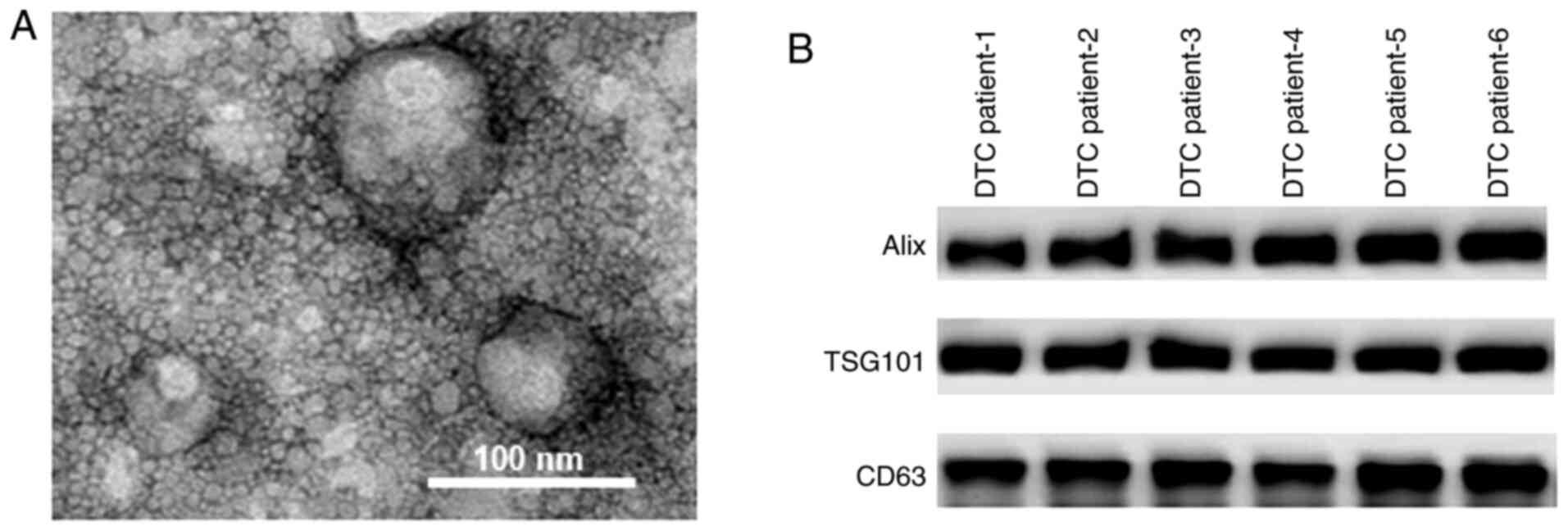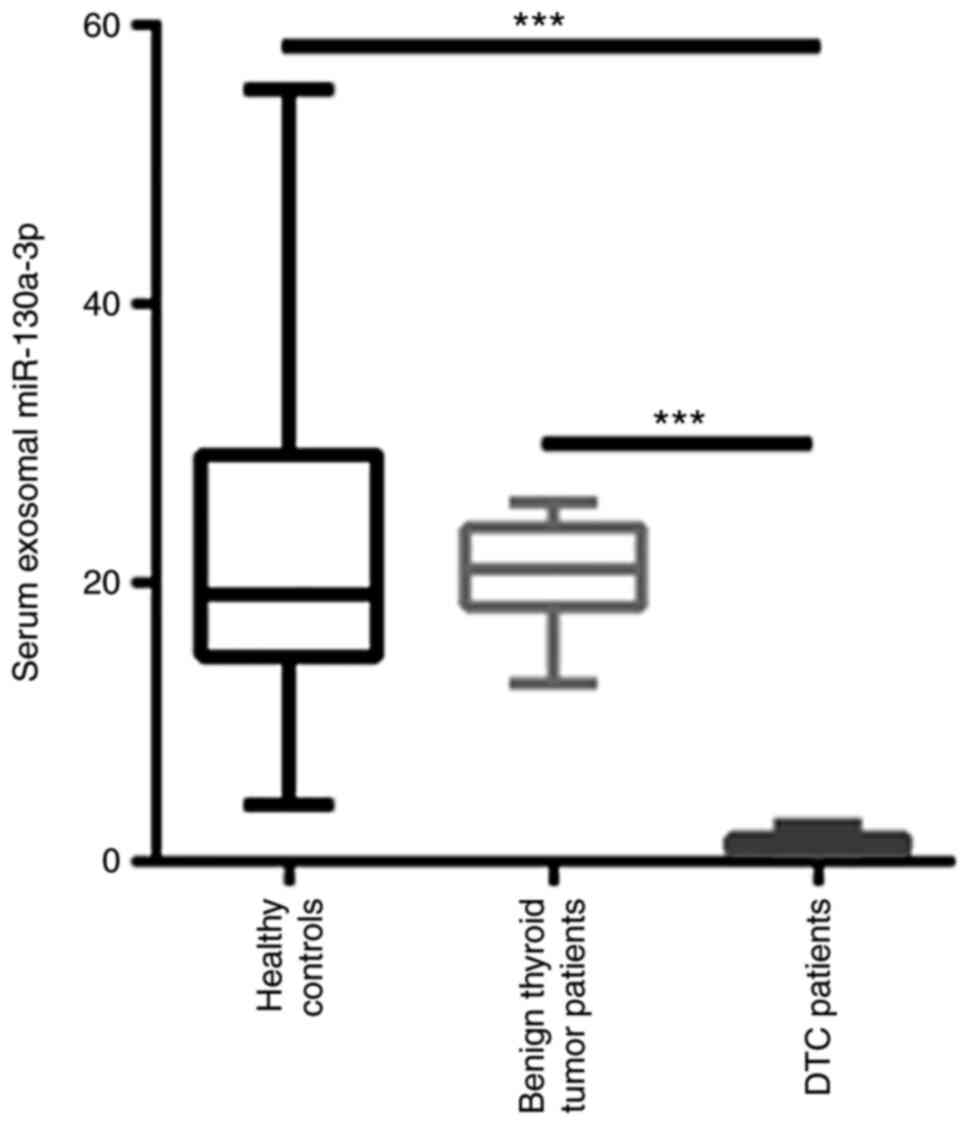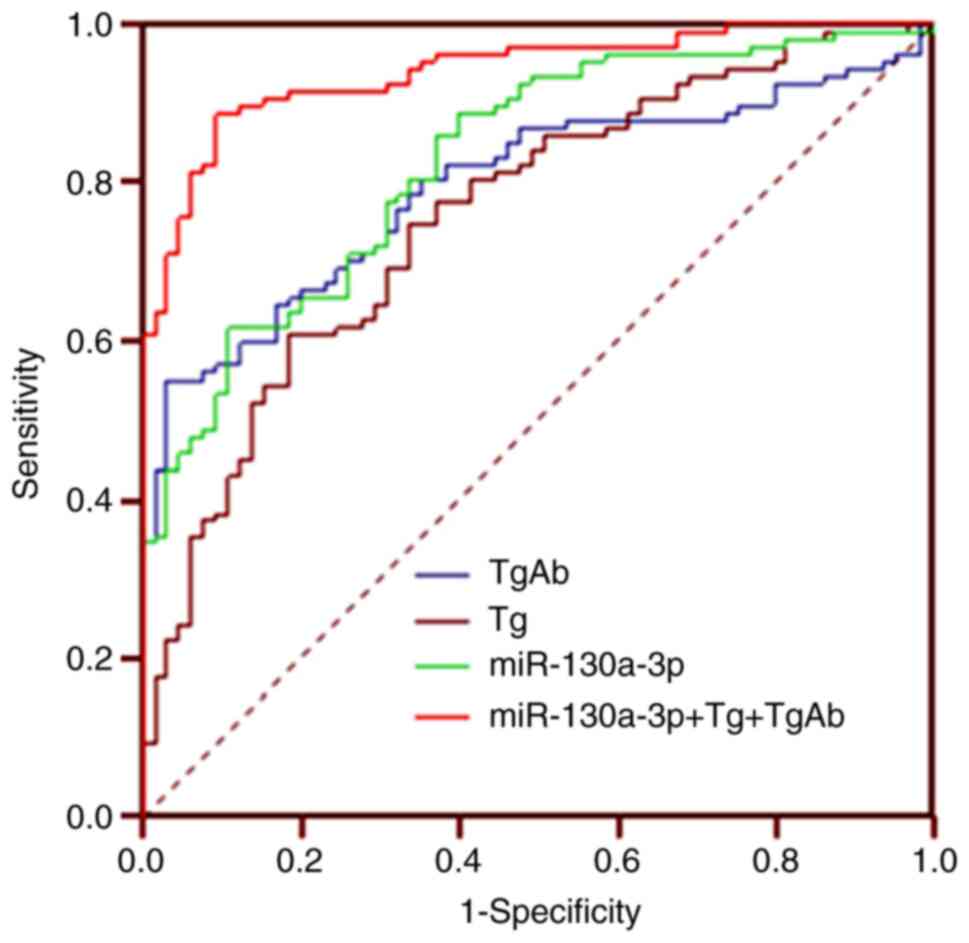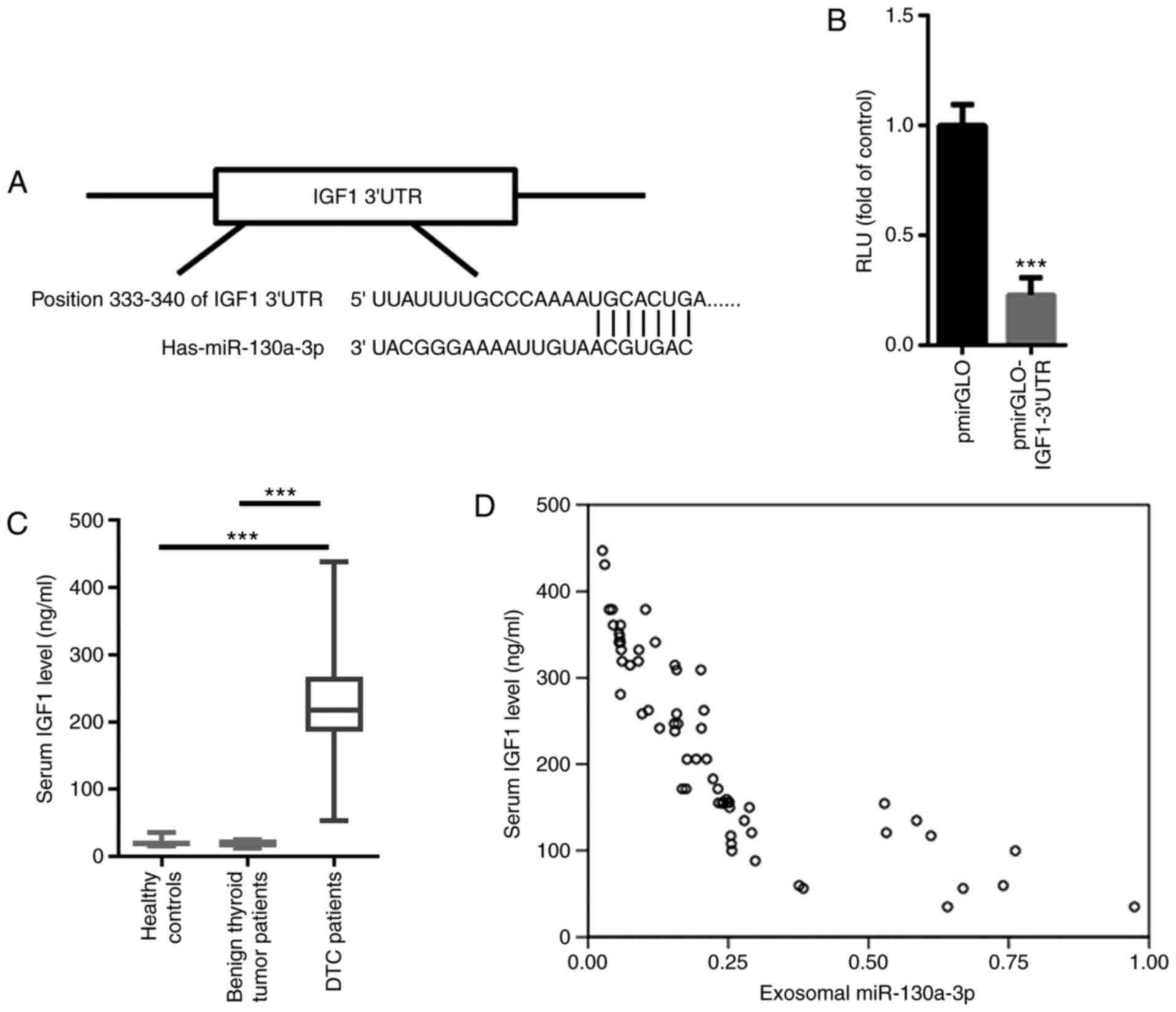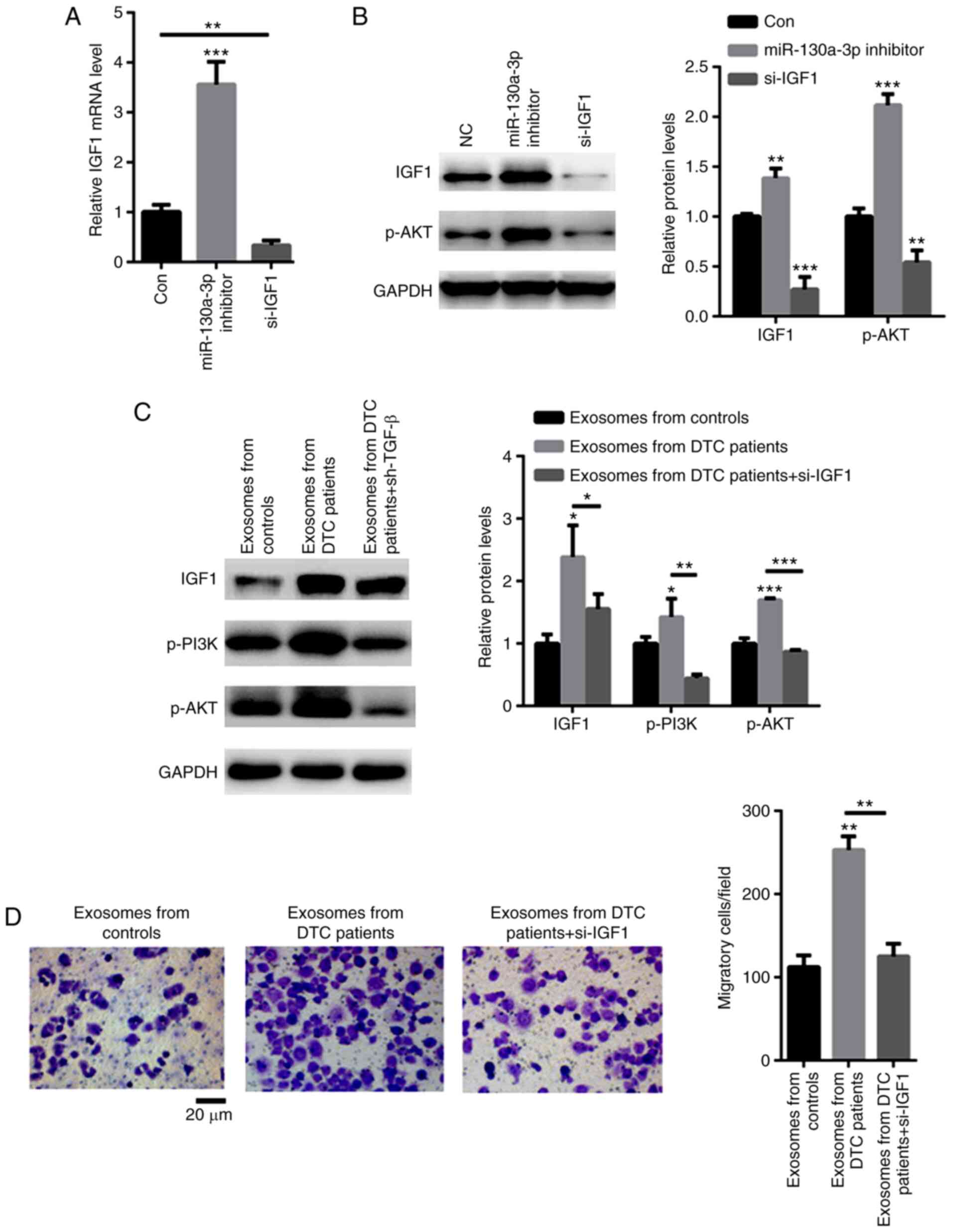|
1
|
Qiu ZL, Wei WJ, Sun ZK, Shen CT, Song HJ,
Zhang XY, Zhang GQ, Chen XY and Luo QY: Circulating tumor cells
correlate with clinicopathological features and outcomes in
differentiated thyroid cancer. Cell Physiol Biochem. 48:718–730.
2018. View Article : Google Scholar : PubMed/NCBI
|
|
2
|
Nickel B, Tan T, Cvejic E, Baade P, McLeod
DSA, Pandeya N, Youl P, McCaffery K and Jordan S: Health-related
quality of life after diagnosis and treatment of differentiated
thyroid cancer and association with type of surgical treatment.
JAMA Otolaryngol Head Neck Surg. 145:231–238. 2019. View Article : Google Scholar : PubMed/NCBI
|
|
3
|
Albano D, Bertagna F, Bonacina M, Durmo R,
Cerudelli E, Gazzilli M, Panarotto MB, Formenti AM, Mazziotti G,
Giustina A and Giubbini R: Possible delayed diagnosis and treatment
of metastatic differentiated thyroid cancer by adopting the 2015
ATA guidelines. Eur J Endocrinol. 179:143–151. 2018. View Article : Google Scholar : PubMed/NCBI
|
|
4
|
Angell TE, Lechner MG, Smith AM, Martin
SE, Groshen SG, Maceri DR, Singer PA and Epstein AL: Circulating
myeloid-derived suppressor cells predict differentiated thyroid
cancer diagnosis and extent. Thyroid. 26:381–389. 2016. View Article : Google Scholar : PubMed/NCBI
|
|
5
|
Pitoia F, Jerkovich F, Smulever A, Brenta
G, Bueno F and Cross G: Should age at diagnosis Be included as an
additional variable in the risk of recurrence classification system
in patients with differentiated thyroid cancer. Eur Thyroid J.
6:160–166. 2017. View Article : Google Scholar : PubMed/NCBI
|
|
6
|
Wang J, Lv B, Su Y, Wang X, Bu J and Yao
L: Exosome-mediated transfer of lncRNA HOTTIP promotes cisplatin
resistance in gastric cancer cells by regulating HMGA1/miR-218
axis. Onco Targets Ther. 12:11325–11338. 2019. View Article : Google Scholar : PubMed/NCBI
|
|
7
|
Soeda N, Iinuma H, Suzuki Y, Tsukahara D,
Midorikawa H, Igarashi Y, Kumata Y, Horikawa M, Kiyokawa T,
Fukagawa T and Fukushima R: Plasma exosome-encapsulated microRNA-21
and microRNA-92a are promising biomarkers for the prediction of
peritoneal recurrence in patients with gastric cancer. Oncol Lett.
18:4467–4480. 2019.PubMed/NCBI
|
|
8
|
Huang J, Shen M, Yan M, Cui Y, Gao Z and
Meng X: Exosome-mediated transfer of miR-1290 promotes cell
proliferation and invasion in gastric cancer via NKD1. Acta Biochim
Biophys Sin (Shanghai). 51:900–907. 2019. View Article : Google Scholar : PubMed/NCBI
|
|
9
|
Zhao K, Wang Z, Li X, Liu JL, Tian L and
Chen JQ: Exosome-mediated transfer of CLIC1 contributes to the
vincristine-resistance in gastric cancer. Mol Cell Biochem.
462:97–105. 2019. View Article : Google Scholar : PubMed/NCBI
|
|
10
|
Jiang K, Li G, Chen W, Song L, Wei T, Li
Z, Gong R, Lei J, Shi H and Zhu J: Plasma exosomal miR-146b-5p and
miR-222-3p are potential biomarkers for lymph node metastasis in
papillary thyroid carcinomas. Onco Targets Ther. 13:1311–1319.
2020. View Article : Google Scholar : PubMed/NCBI
|
|
11
|
Kong X, Zhang J, Li J, Shao J and Fang L:
MiR-130a-3p inhibits migration and invasion by regulating RAB5B in
human breast cancer stem cell-like cells. Biochem Biophys Res
Commun. 501:486–493. 2018. View Article : Google Scholar : PubMed/NCBI
|
|
12
|
Hu B, Zhang H, Wang Z, Zhang F, Wei H and
Li L: LncRNA CCAT1/miR-130a-3p axis increases cisplatin resistance
in non-small-cell lung cancer cell line by targeting SOX4. Cancer
Biol Ther. 18:974–983. 2017. View Article : Google Scholar : PubMed/NCBI
|
|
13
|
Lara OD, Wang Y, Asare A, Xu T, Chiu HS,
Liu Y, Hu W, Sumazin P, Uppal S, Zhang L, et al: Pan-cancer
clinical and molecular analysis of racial disparities. Cancer.
126:800–807. 2020. View Article : Google Scholar : PubMed/NCBI
|
|
14
|
Livak KJ and Schmittgen TD: Analysis of
relative gene expression data using real-time quantitative PCR and
the 2(-Delta Delta C(T)) method. Methods. 25:402–408. 2001.
View Article : Google Scholar : PubMed/NCBI
|
|
15
|
Gholve C, Kumarasamy J, Damle A, Kulkarni
S, Venkatesh M, Banerjee S and Rajan MGR: Comparison of serum
thyroglobulin levels in differentiated thyroid cancer patients
using In-house developed radioimmunoassay and immunoradiometric
procedures. Indian J Clin Biochem. 34:465–471. 2019. View Article : Google Scholar : PubMed/NCBI
|
|
16
|
Jo K and Lim DJ: Clinical implications of
anti-thyroglobulin antibody measurement before surgery in thyroid
cancer. Korean J Intern Med. 33:1050–1057. 2018. View Article : Google Scholar : PubMed/NCBI
|
|
17
|
Du X, Liu Y, Zhao C, Fang J, Wang X and
Wei L: Changes of serum 25(OH) D3 and IGF-1 levels in patients with
thyroid nodules. BMC Endocr Disord. 19:482019. View Article : Google Scholar : PubMed/NCBI
|
|
18
|
Abdullah MI, Junit SM, Ng KL, Jayapalan
JJ, Karikalan B and Hashim OH: Papillary thyroid cancer: Genetic
alterations and molecular biomarker investigations. Int J Med Sci.
16:450–460. 2019. View Article : Google Scholar : PubMed/NCBI
|
|
19
|
Zhang K, Lv J, Peng X, Liu J, Li C, Li J,
Yin N, Li H and Li Z: Down-regulation of DANCR acts as a potential
biomarker for papillary thyroid cancer diagnosis. Biosci Rep.
39:BSR201816162019. View Article : Google Scholar : PubMed/NCBI
|
|
20
|
Allin DM, Shaikh R, Carter P, Thway K,
Sharabiani MTA, Gonzales-de-Castro D, O'Leary B, Garcia-Murillas I,
Bhide S, Hubank M, et al: Circulating tumour DNA is a potential
biomarker for disease progression and response to targeted therapy
in advanced thyroid cancer. Eur J Cancer. 103:165–175. 2018.
View Article : Google Scholar : PubMed/NCBI
|
|
21
|
Yang H, Zhang H, Ge S, Ning T, Bai M, Li
J, Li S, Sun W, Deng T, Zhang L, et al: Exosome-derived miR-130a
activates angiogenesis in gastric cancer by targeting C-MYB in
vascular endothelial cells. Mol Ther. 26:2466–2475. 2018.
View Article : Google Scholar : PubMed/NCBI
|
|
22
|
Zhang H, Deng T, Liu R, Bai M, Zhou L,
Wang X, Li S, Wang X, Yang H, Li J, et al: Exosome-delivered EGFR
regulates liver microenvironment to promote gastric cancer liver
metastasis. Nat Commun. 8:150162017. View Article : Google Scholar : PubMed/NCBI
|
|
23
|
Sundram FX, Sethi VK and Aw SE: Serum
thyroglobulin (Tg) and thyroglobulin antibodies (TgAb) in thyroid
cancer. Ann Acad Med Singap. 15:535–538. 1986.PubMed/NCBI
|
|
24
|
Morbelli S, Ferrarazzo G, Pomposelli E,
Pupo F, Pesce G, Calamia I, Fiz F, Clapasson A, Bauckneht M, Minuto
M, et al: Relationship between circulating anti-thyroglobulin
antibodies (TgAb) and tumor metabolism in patients with
differentiated thyroid cancer (DTC): Prognostic implications. J
Endocrinol Invest. 40:417–424. 2017. View Article : Google Scholar : PubMed/NCBI
|
|
25
|
Giovanella L, Imperiali M, Verburg FA and
Trimboli P: Early post-treatment risk stratification of
differentiated thyroid cancer: Comparison of three high-sensitive
Tg assays. Eur J Endocrinol. 178:75–82. 2018. View Article : Google Scholar : PubMed/NCBI
|
|
26
|
de Meer SGA, Vorselaars WMCM, Kist JW,
Stokkel MPM, de Keizer B, Valk GD, Borel Rinkes IHM and Vriens MR:
Follow-up of patients with thyroglobulin-antibodies: Rising Tg-Ab
trend is a risk factor for recurrence of differentiated thyroid
cancer. Endocr Res. 42:302–310. 2017. View Article : Google Scholar : PubMed/NCBI
|
|
27
|
Krajewska J, Jarzab M, Czarniecka A,
Roskosz J, Kukulska A, Handkiewicz-Junak D, Puch Z, Wygoda Z,
Paliczka-Cieślik E, Kropińska A, et al: Ongoing risk stratification
for differentiated thyroid cancer (DTC)-stimulated serum
thyroglobulin (Tg) before radioiodine (RAI) ablation, the most
potent risk factor of cancer recurrence in M0 patients. Endokrynol
Pol. 67:2–11. 2016. View Article : Google Scholar : PubMed/NCBI
|
|
28
|
Pacini F, Agate L, Elisei R, Capezzone M,
Ceccarelli C, Lippi F, Molinaro E and Pinchera A: Outcome of
differentiated thyroid cancer with detectable serum Tg and negative
diagnostic (131)I whole body scan: Comparison of patients treated
with high (131)I activities versus untreated patients. J Clin
Endocrinol Metab. 86:4092–4097. 2001. View Article : Google Scholar : PubMed/NCBI
|
|
29
|
Kotsantis I, Economopoulou P, Psyrri A,
Maratou E, Pectasides D, Gogas H, Kentepozidis N, Mountzios G,
Dimitriadis G and Giannouli S: Prognostic significance of IGF-1
signalling pathway in patients with advanced non-small cell lung
cancer. Anticancer Res. 39:4185–4190. 2019. View Article : Google Scholar : PubMed/NCBI
|
|
30
|
Salazar-Gonzalez JA, Ruiz-Cruz AA,
Bustos-Jaimes I and Moreno-Fierros L: Expression of breast
cancer-related epitopes targeting the IGF-1 receptor in chimeric
human parvovirus B19 virus-like particles. Mol Biotechnol.
61:742–753. 2019. View Article : Google Scholar : PubMed/NCBI
|
|
31
|
Lawnicka H, Motylewska E, Borkowska M,
Kuzdak K, Siejka A, Swietoslawski J, Stepien H and Stepien T:
Elevated serum concentrations of IGF-1 and IGF-1R in patients with
thyroid cancers. Biomed Pap Med Fac Univ Palacky Olomouc Czech
Repub. 164:77–83. 2020. View Article : Google Scholar : PubMed/NCBI
|
|
32
|
Wu F, Li F, Lin X, Xu F, Cui RR, Zhong JY,
Zhu T, Shan SK, Liao XB, Yuan LQ and Mo ZH: Exosomes increased
angiogenesis in papillary thyroid cancer microenvironment. Endocr
Relat Cancer. 26:525–538. 2019. View Article : Google Scholar : PubMed/NCBI
|
|
33
|
Samsonov R, Burdakov V, Shtam T,
Radzhabovа Z, Vasilyev D, Tsyrlina E, Titov S, Ivanov M, Berstein
L, Filatov M, et al: Plasma exosomal miR-21 and miR-181a
differentiates follicular from papillary thyroid cancer. Tumour
Biol. 37:12011–12021. 2016. View Article : Google Scholar : PubMed/NCBI
|















